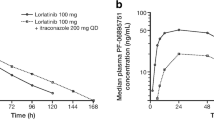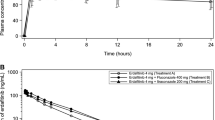Abstract
Purpose
Dovitinib is an orally available multi tyrosine kinase inhibitor which inhibits VEGFR 1–3, FGFR 1–3, and PDGFR. This study was performed to investigate the potential drug–drug interaction of dovitinib with the CYP1A2 inhibitor fluvoxamine in patients with advanced solid tumors.
Methods
Non-smoking patients of ≥ 18 years with advanced solid tumors, excluding breast cancer, were included. Patients were treated with a dose of 300 mg in 5 days on/2 days off schedule. Steady-state pharmacokinetic assessments of dovitinib were performed with or without fluvoxamine.
Results
Forty-five patients were enrolled; 24 were evaluable for drug–drug interaction assessment. Median age was 60 years (range 30–85). At steady state the geometric mean for dovitinib (coefficient of variation%) of the area under the plasma concentration–time curve (AUC0–72h) and maximum concentration (C max) were 2880 ng/mL h (47%) and 144 ng/mL (41%), respectively. Following administration of dovitinib in combination with fluvoxamine the geometric mean of dovitinib AUC0–72h and C max were 8290 ng/mL h (60%) and 259 ng/mL (45%), respectively. The estimated geometric mean ratios for dovitinib AUC0–72h and C max (dovitinib + fluvoxamine vs. dovitinib alone) were 2.88 [90% confidence interval (CI) 2.58, 3.20] and 1.80 (90% CI 1.66, 1.95). This effect is considered a moderate drug–drug interaction.
Conclusions
Fluvoxamine co-administration resulted in a 80% increase in C max and a 188% increase in AUC0–72h of dovitinib. Given the increase in exposure to dovitinib observed, patients are at risk of dovitinib related toxicity. Dovitinib should, therefore, not be co-administered with moderate and strong CYP1A2 inhibitors, without dose reduction.

Similar content being viewed by others
Abbreviations
- AUC:
-
Area under the plasma concentration–time curve
- CLss/F :
-
Apparent oral steady state clearance
- C max :
-
Maximum plasma concentration
- CV%:
-
Coefficient of Variation%
- CYP:
-
Cytochrome P450 enzyme
- DDI:
-
Drug–drug interaction
- ECOG:
-
Eastern Cooperative Oncology Group
- FGF:
-
Fibroblast growth factor
- FGFR:
-
Fibroblast growth factor receptor
- GIST:
-
Gastro-intestinal stromal tumor
- MTD:
-
Maximum tolerated dose
- PDGF:
-
Platelet-derived growth factor
- PDGFR:
-
Platelet-derived growth factor receptor
- PK:
-
Pharmacokinetics
- PAS:
-
Pharmacokinetic analyses set
- TDM:
-
Therapeutic drug monitoring
- TK:
-
Tyrosine kinase
- T max :
-
Time to reach maximum plasma concentration
- T 1/2 :
-
Terminal half-life
- VEGF:
-
Vascular endothelial growth factor
- VEGFR:
-
Vascular endothelial growth factor receptor
References
Renhowe PA, Pecchi S, Shafer CM, Machajewski TD, Jazan EM, Taylor C, Antonios-McCrea W, McBride CM, Frazier K, Wiesmann M, Lapointe GR, Feucht PH, Warne RL, Heise CC, Menezes D, Aardalen K, Ye H, He M, Le V, Vora J, Jansen JM, Wernette-Hammond ME, Harris AL (2009) Design, structure-activity relationships and in vivo characterization of 4-amino-3-benzimidazol-2-ylhydroquinolin-2-ones: a novel class of receptor tyrosine kinase inhibitors. J Med Chem 52:278–292. doi:10.1021/jm800790t
Angevin E, Lopez-Martin J a, Lin C-C, Gschwend JE, Harzstark A, Castellano D, Soria J-C, Sen P, Chang J, Shi M, Kay A, Escudier B (2013) Phase I study of dovitinib (TKI258), an oral FGFR, VEGFR, and PDGFR inhibitor, in advanced or metastatic renal cell carcinoma. Clin Cancer Res 19:1257–1268. doi:10.1158/1078-0432.CCR-12-2885
Kim KB, Chesney J, Robinson D, Gardner H, Shi MM, Kirkwood JM (2011) Phase I/II and pharmacodynamic study of dovitinib (TKI258), an inhibitor of fibroblast growth factor receptors and VEGF receptors, in patients with advanced melanoma. Clin Cancer Res 17:7451–7461. doi:10.1158/1078-0432.CCR-11-1747
Sarker D, Molife R, Evans TRJ, Hardie M, Marriott C, Butzberger-Zimmerli P, Morrison R, Fox JA, Heise C, Louie S, Aziz N, Garzon F, Michelson G, Judson IR, Jadayel D, Braendle E, de Bono JS (2008) A phase I pharmacokinetic and pharmacodynamic study of TKI258, an oral, multitargeted receptor tyrosine kinase inhibitor in patients with advanced solid tumors. Clin Cancer Res 14:2075–2081. doi:10.1158/1078-0432.CCR-07-1466
Escudier B, Grünwald V, Ravaud A, Ou Y-C, Castellano D, Lin C-C, Gschwend JE, Harzstark A, Beall S, Pirotta N, Squires M, Shi M, Angevin E (2014) Phase II results of Dovitinib (TKI258) in patients with metastatic renal cell cancer. Clin Cancer Res 20:3012–3022. doi:10.1158/1078-0432.CCR-13-3006
Kang Y-K, Yoo C, Ryoo B-Y, Lee JJ, Tan E, Park I, Park JH, Choi YJ, Jo J, Ryu J-S, Ryu M-H (2013) Phase II study of dovitinib in patients with metastatic and/or unresectable gastrointestinal stromal tumours after failure of imatinib and sunitinib. Br J Cancer 109:2309–2315. doi:10.1038/bjc.2013.594
Keam B, Kim S-B, Shin SH, Cho BC, Lee K-W, Kim MK, Yun H-J, Lee S-H, Yoon DH, Bang Y-J (2015) Phase 2 study of dovitinib in patients with metastatic or unresectable adenoid cystic carcinoma. Cancer 121:2612–2617. doi:10.1002/cncr.29401
Konecny GE, Finkler N, Garcia AA, Lorusso D, Lee PS, Rocconi RP, Fong PC, Squires M, Mishra K, Upalawanna A, Wang Y, Kristeleit R (2015) Second-line dovitinib (TKI258) in patients with FGFR2-mutated or FGFR2-non-mutated advanced or metastatic endometrial cancer: a non-randomised, open-label, two-group, two-stage, phase 2 study. Lancet Oncol 16:686–694. doi:10.1016/S1470-2045(15)70159-2
Lim SM, Chung WY, Nam K-H, Kang S-W, Lim JY, Kim H-G, Shin SH, Sun J-M, Kim S-G, Kim J-H, Kang CW, Kim HR, Cho BC (2015) An open label, multicenter, phase II study of dovitinib in advanced thyroid cancer. Eur J Cancer 51:1588–1595. doi:10.1016/j.ejca.2015.05.020
Milowsky MI, Dittrich C, Durán I, Jagdev S, Millard FE, Sweeney CJ, Bajorin D, Cerbone L, Quinn DI, Stadler WM, Rosenberg JE, Lochheed M, Sen P, Squires M, Shi M, Sternberg CN (2014) Phase 2 trial of dovitinib in patients with progressive FGFR3-mutated or FGFR3 wild-type advanced urothelial carcinoma. Eur J Cancer 50:3145–3152. doi:10.1016/j.ejca.2014.10.013
Scheid C, Reece D, Beksac M, Spencer A, Callander N, Sonneveld P, Kalimi G, Cai C, Shi M, Scott JW, Stewart AK (2015) Phase 2 study of dovitinib in patients with relapsed or refractory multiple myeloma with or without t(4;14) translocation. Eur J Haematol 95:316–324. doi:10.1111/ejh.12491
Schmidinger M (2014) Third-line dovitinib in metastatic renal cell carcinoma. Lancet Oncol 15:245–246. doi:10.1016/S1470-2045(14)70082-8
Motzer RJ, Porta C, Vogelzang NJ, Sternberg CN, Szczylik C, Zolnierek J, Kollmannsberger C, Rha SY, Bjarnason GA, Melichar B, De Giorgi U, Grünwald V, Davis ID, Lee J-L, Esteban E, Urbanowitz G, Cai C, Squires M, Marker M, Shi MM, Escudier B (2014) Dovitinib versus sorafenib for third-line targeted treatment of patients with metastatic renal cell carcinoma: an open-label, randomised phase 3 trial. Lancet Oncol 15:286–296. doi:10.1016/S1470-2045(14)70030-0
Cheng A-L, Thongprasert S, Lim HY, Sukeepaisarnjaroen W, Yang T-S, Wu C-C, Chao Y, Chan SL, Kudo M, Ikeda M, Kang Y-K, Pan H, Numata K, Han G, Balsara B, Zhang Y, Rodriguez A-M, Zhang Y, Wang Y, Poon RTP (2016) Randomized, open-label phase 2 study comparing frontline dovitinib versus sorafenib in patients with advanced hepatocellular carcinoma. Hepatology 64:774–784. doi:10.1002/hep.28600
San Carlos CNPD 2013 Dovitinib [investigator brochure]
Dubbelman A-C, Upthagrove A, Beijnen JH, Marchetti S, Tan E, Krone K, Anand S, Schellens JHM (2012) Disposition and metabolism of 14C-dovitinib (TKI258), an inhibitor of FGFR and VEGFR, after oral administration in patients with advanced solid tumors. Cancer Chemother Pharmacol 70:653–663. doi:10.1007/s00280-012-1947-2
Pastrakuljic A, Tang BK, Roberts EA, Kalow W (1997) Distinction of CYP1A1 and CYP1A2 activity by selective inhibition using fluvoxamine and isosafrole. Biochem Pharmacol 53:531–538
Das M, Padda SK, Frymoyer A, Zhou L, Riess JW, Neal JW, Wakelee HA (2015) Dovitinib and erlotinib in patients with metastatic non-small cell lung cancer: A drug-drug interaction. Lung Cancer 89:280–286. doi:10.1016/j.lungcan.2015.06.011
Jeppesen U, Gram LF, Vistisen K, Loft S, Poulsen HE, Brøsen K (1996) Dose-dependent inhibition of CYP1A2, CYP2C19 and CYP2D6 by citalopram, fluoxetine, fluvoxamine and paroxetine. Eur J Clin Pharmacol 51:73–78
Rasmussen BB, Maënpää J, Pelkonen O, Loft S, Poulsen HE, Lykkesfeldt J, Brøsen K (1995) Selective serotonin reuptake inhibitors and theophylline metabolism in human liver microsomes: potent inhibition by fluvoxamine. Br J Clin Pharmacol 39:151–159
Rasmussen BB, Nielsen TL, Brøsen K (1998) Fluvoxamine is a potent inhibitor of the metabolism of caffeine in vitro. Pharmacol Toxicol 83:240–245
Lam YWF, Alfaro CL, Ereshefsky L, Miller M (2003) Pharmacokinetic and pharmacodynamic interactions of oral midazolam with ketoconazole, fluoxetine, fluvoxamine, and nefazodone. J Clin Pharmacol 43:1274–1282. doi:10.1177/0091270003259216
Lamberg TS, Kivistö KT, Laitila J, Mårtensson K, Neuvonen PJ The effect of fluvoxamine on the pharmacokinetics and pharmacodynamics of buspirone. Eur J Clin Pharmacol 54:761–766
Spigset O, Carleborg L, Hedenmalm K, Dahlqvist R (1995) Effect of cigarette smoking on fluvoxamine pharmacokinetics in humans. Clin Pharmacol Ther 58:399–403. doi:10.1016/0009-9236(95)90052-7
Vezmar S, Miljkovic B, Vucicevic K, Timotijevic I, Prostran M, Todorovic Z, Pokrajac M (2009) Pharmacokinetics and efficacy of fluvoxamine and amitriptyline in depression. J Pharmacol Sci 110:98–104
Christensen M, Tybring G, Mihara K, Yasui-Furokori N, Carrillo JA, Ramos SI, Andersson K, Dahl M-L, Bertilsson L (2002) Low daily 10-mg and 20-mg doses of fluvoxamine inhibit the metabolism of both caffeine (cytochrome P4501A2) and omeprazole (cytochrome P4502C19). Clin Pharmacol Ther 71:141–152. doi:10.1067/mcp.2002.121788
Food and Drug Administration (FDA) (2012) Guidance for industry drug interaction studies—study design, data analysis, implications for dosing, and labeling recommendations. https://www.fda.gov/downloads/Drugs/Guidances/ucm292362.pdf. Accessed 15 May 2017
Miura M, Ohkubo T (2007) Identification of human cytochrome P450 enzymes involved in the major metabolic pathway of fluvoxamine. Xenobiotica 37:169–179. doi:10.1080/00498250600718464
Acknowledgements
We thank all of the patients and their families for their participation.
Author information
Authors and Affiliations
Corresponding author
Ethics declarations
Ethical standards
The study was performed in compliance with the Declaration of Helsinki and its amendments. All patients provided informed consent prior to participation. The study was registered in clinicaltrials.gov (identifier: NCT01700270).
Funding
This study (NCT01700270) was funded by Novartis Pharmaceuticals.
Conflict of interest
Jeffrey Scott, Arnand Suraj and Eugene Tan are employees of Novartis Pharmaceuticals. The other authors declare that they have no competing interests.
Rights and permissions
About this article
Cite this article
de Weger, V.A., Goel, S., von Moos, R. et al. A drug–drug interaction study to assess the effect of the CYP1A2 inhibitor fluvoxamine on the pharmacokinetics of dovitinib (TKI258) in patients with advanced solid tumors. Cancer Chemother Pharmacol 81, 73–80 (2018). https://doi.org/10.1007/s00280-017-3469-4
Received:
Accepted:
Published:
Issue Date:
DOI: https://doi.org/10.1007/s00280-017-3469-4




